Hands. Love. How often do you consciously put those two words together?
As a celebrant, they’re both at the heart of my work. My wedding couples place rings on each other’s fourth finger of the left hand, for the ancients believed the Vena Amoris (Latin for the ‘vein of love’) flowed from there to the heart, and back again.
This tradition continues for the simple reason that we recognise the hands to be integral in how we show our care for a loved one: a tender caress, the touch of a brow, back of a bent finger to wipe away a tear, hands cupping cheeks to draw our love closer, the holding of hands to protect and nurture a child, or to share a walk with our lover.
I’ve been teaching my wee granddaughter to blow kisses by bringing her hand to her lips and then pushing it away with a big blow. It has become a beautiful bonding ritual for this grandmother and granddaughter who live at a distance from each other.
My wedding couples may have their hands bound together in the sacred figure of eight ~ eternity ~ during a Handfasting ritual. When I consciously ‘tie the knot’ for a couple, I do so with the awareness on which the ritual was founded. There are three cords: Bride, Groom and God. So, regardless of the couple’s or my beliefs (and whether they’re opposite or same sex), I hold the intention in my mind that there are three distinct energies being consciously connected as they cross the threshold from two lives into a shared life path: two humans and the Universal Life Force which exists in all of us and is everywhere. For those whose hands are being tied, and those who are witnessing, we effortlessly transcend all belief systems and recognise the sanctity of a ritual based on love.
Hands connect us. In ceremonies, we may hold hands in a circle. Perhaps we’re touching the toes or cheeks of a baby during a naming ceremony. Maybe our hand touches a shroud or coffin as we say goodbye and walk away from our friend for one last time. A groom may lift his bride’s veil. The bride holds her bouquet. She may well toss it, with love, into a crowd of single friends who hope to be the ‘next one’ married. In a Blessingway ceremony, all the women sit in circle and then take part in a red-thread ritual which sees our hands all tied together in a web.
Six years ago yesterday, my father was killed in a car accident in Australia. I flew over for the funeral. When I walked down the aisle in the crematorium before the service, I could see a few of my siblings (I have seven of them) standing by the coffin. That’s when I realised it was open, and they were talking to our Dad.
To hold his hands ~ hands which had toiled hard in his 77 years on this Earth ~ was an honour, as well as a deeply healing and spontaneous ritual, which would prove enormously important in my walk, hand in hand, with sorrow. There, in those precious few minutes as time stood still, I was able to thank him for everything he did for us: providing a lifestyle that enabled me to have the most awesome childhood growing up in rural Australia surrounded by dozens of horses and a lot of land.
The idea of holding the body of a dead person might just be too much for many people, and yet, for me, it was one of the most beautiful and honest moments of my whole life. There was a depth of love, forgiveness and emotional intimacy that still gives me solace in my darker hours.
I held my mother-in-law’s hand as she passed over onto her adventures Spiritside. My same hands have had the pleasure of raising two daughters and sharing countless walks together. They’ve caressed my granddaughter’s beautiful face. They’ve cooked meals for friends, family and strangers. My hands have tended gardens, a place where they are always happy.
They have received a wedding ring and a vow renewal ring. I also wear my mother’s wedding ring.
My hands allow me to open the pages of a book ~ one of my favourite things to do is read. Turning the pages becomes a meditative practice. These same hands allow me to express my thoughts and feelings through writing books. For some reason, I’m able to type as quick as I think. My hands are intricately and intimately connected to my thought processes.
It is with my hands that I hold a pen to craft words on the weekly cards I send to my mother in Tasmania. These same hands open the cards she sends to me.
Self love, self care, self nurture ~ call it what you will ~ are aided by my able hands: plucking a cinnamon, cardamom and ginger teabag from the box so I can steep some spices in boiling water. Picking up my toothbrush, lathering my skin with rose and geranium soap, washing my hair with rosemary shampoo ~ they all require my hands.
Choosing the clothes I’ll wear, lighting a stick of Nag Champa incense, inserting a CD of favourite music, opening the window for fresh air, picking a bouquet of flowers, tying my shoelaces (double knots ~ learnt the hard way) so I can go for a run….all this care, all this tending to my needs, is done because my hands are my tools, yes, but they are my reliable friends. Always ready. Always able. I am so grateful!
From the youngest age, I was witness to my mother’s hands as she weaved her way consciously through each day, beginning with her morning yoga and meditation, then squeezing a fresh orange juice for her brood of kidlings. Mum fashioned a life of creativity and pleasure: nurturing a thriving garden, sewing clothes and rag dolls, building forts and castles from wood, baking cakes and cooking soup, and playing me her mouth organ or mandolin as I fell asleep at night. Her hands would nurture me by massaging my back or bringing me rosehip and hibiscus tea if I wasn’t feeling well. At night, we’d often sleep outside under the stars. My hand slipped inside hers as we drifted off to dreamland.
In my lifetime, these hands have played instruments: ukulele, panpipes, button accordion, piano and cello. Not well, but they’ve tried! My hands allow me to experience the world, whether it’s through driving a car, touching a tree, holding my loved one’s hand, baking a cake, gathering wood for a fire, washing my hair, bringing food to my mouth, and as much as anything, I use my hands to talk! Fun fact: I don’t think I could actually speak if my hands were tied up!
I once wrote a song called Grandmother’s Hands. (My mother’s mother’s hands look so similar to mine). Although we never met, I ‘see’ her whenever I look down upon my hands.
I have welcomed the hands of others upon my skin: reflexology, aromatherapy massage, Indian head massage, sports therapy massage, the clasp of a child’s hand, the touch of a lover, my mother’s sweet hands, standing in a circle holding hands with others in ceremony, celebration or silence, shaking hands in a business meeting, my hairdresser washing and cutting my hair, and helping another through a tough time in their life and symbolically holding hands.
Some people don’t have hands, either by birth or accident. Their way of expressing and receiving love needs to be channelled in other ways. The body adapts. It finds ways to say what would otherwise be shared through the hands.
Hands can hurt or hands can heal. They can’t do both at the same time. Like our words, we have a choice every day as to whether they will be a ballistic force or a beautiful balm.
Hands are not for hitting, and yet for many people hands are not the bearers of love but weapons of cruelty and torture. They bring pain, shame and humiliation, and fear. If that has been our experience, we may never expect that it could be any different for us. A hand of kindness reaching our way may cause us to flinch, to step back, to run away. Only time and trust will tell if a person can open up to new ways of being.
There’s a funny gadget on the market called a fidget spinner. It’s for people who can’t keep their hands still. The thought of such a thing actually makes me feel rather ill. For me, the hands contain vast amounts of energy. Rather than fidget, it comes naturally to me to simply bring my hands together, in prayer or clasp mode, and allow the energy I’m feeling to continue flowing through my body (to re-energise me), rather than to be frenetically dispersed into an inanimate object.
As a celebrant, I use my hands to greet mourners, welcome a couple or family, meet guests, hold my ceremony script, scatter rose petals, gather flowers or herbs for rituals, warm the rings and thread a twig of rosemary through them, create a sacred altar, tie a handfasting knot, lift a Quaich for the couple to drink, offer Welsh spoons or sprinkle fairy dust. There are many ways my hands are essential to my work. They are always used with love.
We make a toast to the happy couple using our hands to hold a glass and tilt it to another person. Chink! We applaud by clapping.
Hands. How do you use yours? Do they express themselves primarily through love or fear?
Think of those you love most in the world. Take a moment, if you will, and ponder this thought: if you had only this one day left on Earth to tell your lover (or other loved one) how you felt about them using only your hands, how would you do so?

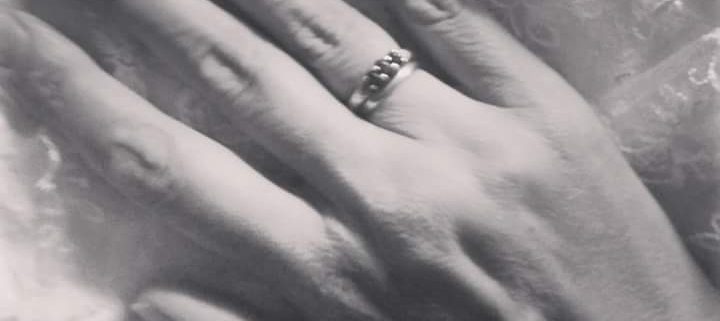
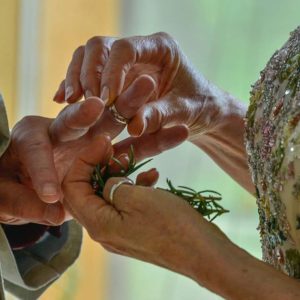

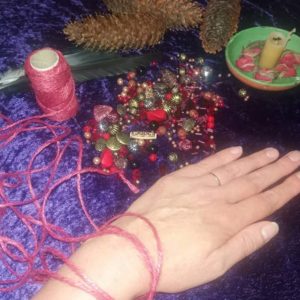
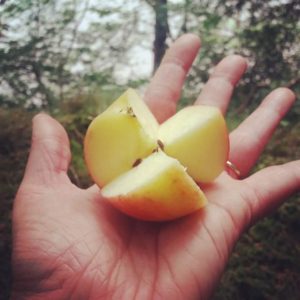
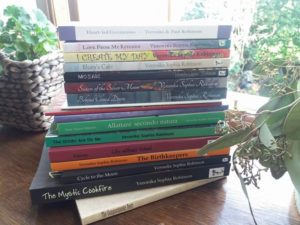

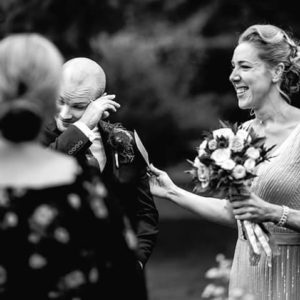
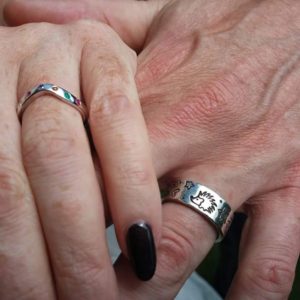
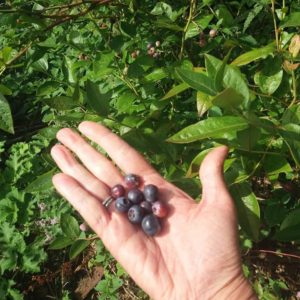
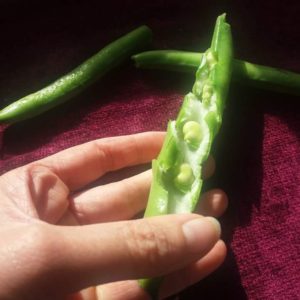


What beautiful writing, musings on hands. Love it. Brought me to tears (especially holding your passes father’s hands, wow) and made me smile various times.
Thank you for sharing x